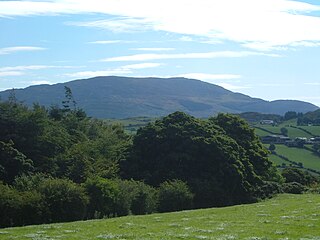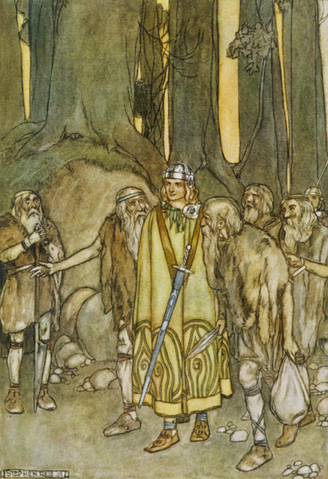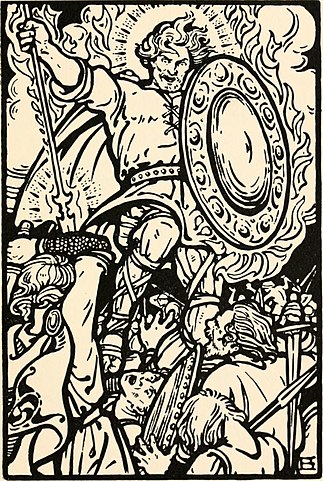The Hunt of Slieve Cuilinn

Irish mythology is a treasure trove of enchanting tales filled with legendary heroes, mystical landscapes, and the ever-present influence of the supernatural. Among these tales stands the Hunt of Slieve Cuilinn, a captivating story that twists themes of betrayal, transformation, and loyalty. At its heart is the legendary warrior Fionn mac Cumhaill, leader of the Fianna and one of Ireland’s most beloved mythological figures. In this blog post, we’ll delve into the magical tale of The Hunt of Slieve Cuilinn, exploring its story, themes, and the rich cultural significance it holds.
Slieve Cuilinn
Our story begins on Slieve Cuilinn, a majestic mountain in County Armagh, steeped in myth and mystery. Like many places in Ireland, this landscape is not just a geographical feature but a character in the nation’s folklore. In Irish mythology, mountains, lakes, and other natural landmarks often serve as the stage for epic adventures, their presence woven deeply into the fabric of the stories.
The Tale of the Hunt

On a fine day, Fionn mac Cumhaill and his loyal band of warriors, the Fianna, set out on a hunting expedition on the slopes of Slieve Cuilinn. Their hunt takes an unexpected turn when they encounter a mysterious woman of extraordinary beauty. Her presence is mesmerising, and her allure quickly captures Fionn’s attention.
The woman, however, is not what she seems. She convinces Fionn to follow her alone to a nearby lake, promising wonders beyond imagination. Entranced, Fionn agrees, but upon stepping into the water, he is transformed into an aged, frail old man. His strength, vitality, and youth are stripped away, leaving him unrecognisable.
When Fionn fails to return, the Fianna begin a desperate search. Eventually, they discover the transformed Fionn and realise the woman is a síde, a supernatural being from the Otherworld who sought revenge for a long-forgotten slight.
A Return to Youth

The Fianna, steadfast in their loyalty, carried the frail and aged Fionn mac Cumhaill toward the hill of the Sidhe in Cuailgne. The hill loomed before them, shrouded in mist, its slopes whispering of ancient powers and secrets. It was said to be a gateway to the Otherworld, where mortals rarely ventured and returned unchanged. They laid their leader at the hill’s base and called out for aid, their voices echoing into the earth. But the Sidhe, if they were listening, offered no reply.
The warriors laboured tirelessly for three days and three nights, their resolve as unyielding as the land they dug. With hands blistered and tools worn, they tore at the sacred hill, their efforts a mix of desperation and defiance. They knew the risks—disturbing the Otherworld was no small act—but their love for Fionn outweighed any fear of retribution.
On the dawn of the fourth day, the earth trembled beneath their feet. From the hill emerged a figure of otherworldly majesty, his presence both commanding and serene. He was called Cuilinn of Cuailgne, though some whispered that this was but another guise of the great Manannán mac Lir, the god of the sea and master of the Otherworld. Deep as the ocean, his eyes swept over the warriors and the aged Fionn who lay before him.
Wordlessly, Cuilinn held forth a vessel of red gold, its surface shimmering like sunlight on water. It was intricately wrought, adorned with runes that seemed to hum with an ancient power. The Fianna stepped back as he approached Fionn, who gazed up at him with the weariness of his years etched into his face.
“Drink,” Cuilinn said, his voice a blend of the wind and the tide, as timeless as the earth itself.
Fionn took the vessel with trembling hands and drank deeply. The liquid was warm and rich, with a vitality coursing through his body, unlike anything he had tasted before. Instantly, his strength returned, his limbs regaining vigour, and his form restored to its former glory. The Fianna watched in awe as their leader stood tall again, his spirit renewed.
But there was one thing the drink could not mend. Once as golden as the sun, Fionn’s hair remained grey as the clouds that hung over Slieve Cuilinn. It was a reminder of the wisdom gained through hardship and the unyielding passage of time.
Cuilinn, his task complete, turned and vanished back into the hill, leaving the Fianna to celebrate the return of their leader. Though Fionn’s youth had been restored, the grey in his hair told of the trials he had endured—and the deep, enduring magic of the Sidhe.
Themes and Lessons
The Hunt of Slieve Cuilinn is more than just an adventure; it is a tale layered with symbolism and timeless lessons.
- The Power of the Supernatural: The síde woman represents the unpredictable and often dangerous allure of the Otherworld, a recurring theme in Irish mythology.
- Loyalty and Companionship: The unwavering determination of the Fianna to save their leader highlights the deep bonds of loyalty and friendship that define their group.
- A Cautionary Tale: Fionn’s transformation is a reminder of the dangers of succumbing to temptation and straying into unknown realms, a warning that resonates even today.
The Myth’s Connection to the Landscape
Slieve Cuilinn is not just a backdrop but an integral part of the story. Like many Irish myths, this tale ties the supernatural to the physical landscape, imbuing the mountain with a sense of magic and mystery. Visitors to Slieve Cuilinn today can feel the echoes of Fionn’s adventure, walking in the footsteps of legends.
Why This Tale Still Resonates
At its core, The Hunt of Slieve Cuilinn is a tale of transformation, resilience, and the enduring strength of community. Fionn’s ordeal and the Fianna’s loyalty remind us of the importance of companionship and bravery in adversity. The story also showcases the timeless allure of Irish mythology, where the boundaries between the mortal and supernatural worlds are delightfully blurred.
Conclusion
The Hunt of Slieve Cuilinn is a tale that captures the imagination, blending magic, danger, and heroism into a story that continues to inspire. It reminds us of the richness of Irish mythology and its deep connection to the land.
If you ever find yourself in County Armagh, consider visiting Slieve Cuilinn to experience the magic of this legendary site. And if you enjoyed this tale, let us know in the comments—what’s your favourite Irish myth or legend? Share your thoughts and keep the tradition of storytelling alive!
References
Gregory, Lady Agusta. Irish Myths and Legends: Gods and Fighting Men. New Island Books 2022.
